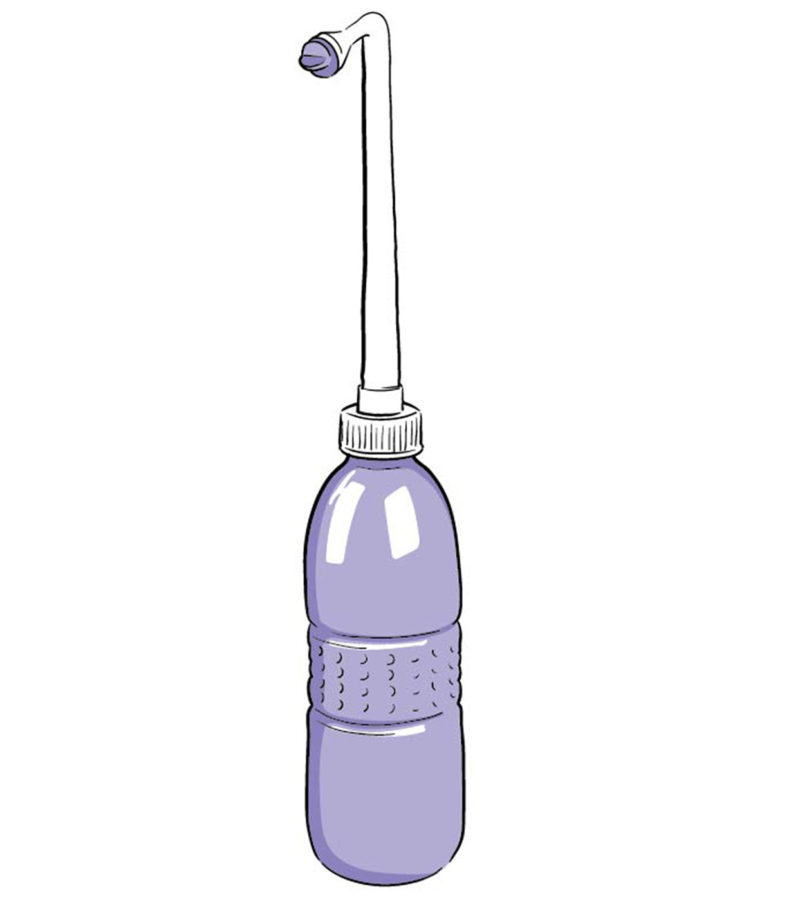FEATUREs:
- Ergonomic squeeze bottle
- Angled nozzle
- No batteries required
- Air-lock technology for stronger spray
My roommate burst out of the bathroom clutching a thin piece of metal several feet long in one hand and a pair of wire cutters in the other. “I managed to get the pipe out,” he said. “It drives me crazy when I’m trying to pee.”
I was twenty-one, and it was the first time I’d lived with a Western roommate. This was in Cairo, in a small apartment downtown. “But that’s the shattafa,” I objected, using the Arabic word. “How are we going to use the toilet now?”
It was there and then that I became aware of the most significant cultural difference between East and West: this metal pipe, the shattafa.
We went into the bathroom together, and I explained to him the process, step by step. In most Arab countries, and indeed many Eastern countries from Japan to India, a shattafa—or bidet shower—is an integral part of a toilet. The people of these parts of the world use water to wash after urinating or defecating, reserving toilet paper for drying afterward.
There are two kinds of shattafa. With the kind installed inside the toilet, when you turn the faucet on, water sluices out of the pipe to rinse your undercarriage. The wall-mounted variety is a bit more complicated. You grasp the showerhead and direct the nozzle; with your other hand, you turn on the faucet. Then you can dry off with toilet paper.
It wasn’t until 2008 that I traveled to a Western country—the United States. My digestion and bowel movements were out of whack for days, which was especially keenly felt sans shattafas. A friend advised me to keep a plastic water bottle next to the toilet, a temporary solution, but every time I returned to my hotel room, I’d find that the cleaner had taken the bottle away, thinking it was trash. In the end, I assimilated to Western civilization and learned to wipe my ass with paper alone.
Throughout history, people have utilized numerous cleaning tools—pebbles, corn leaves, newspapers, and telephone directories—in place of toilet paper as we know it today. Islam gives clear instructions for washing that include the use of water—a basic condition for the state of purity. In fact, Muslims have performed the washing ritual for over a thousand years, developing various plumbing fixtures for expelling and washing, culminating with the ceramic and wood toilets of the Ottoman period, which replaced the holes previously used for urination. A similar design began to appear in Italy and France. What is now known as the bidet—a freestanding apparatus—emerged in the seventeenth century. (Personally, I’ve never understood the purpose of getting off the toilet with shit still clinging to you, only to sit somewhere else to wash it off.)
Britain, however, remained bidet-less, and most of its colonies, including British America, followed suit—perhaps the Anglophones saw the invention as a vehicle for French decadence and immorality. But in this age of late capitalism, the free market, and the internet, it has become possible to bridge the divide between East and West—all thanks to the invention of the portable shattafa. Or, as Amazon calls it, the “Portable Bidet Sprayer and Travel Bidet with Hand Held Bidet Bottle for Personal Cleansing Use—Include Extended Nozzle—Personal Hygiene Care Toilet Bidet Shower/Bathroom Bidet Spray—21.8 oz (620ml).”
This portable version comes in two shades of blue and three sizes—380, 420, and 620 milliliters (international measurements, naturally). It consists of a refillable plastic bottle with a nozzle cap; when squeezed, it sends water shooting out at whichever part of your person you want to rinse. As soon as I became aware of this product, in 2018, I immediately bought myself one. Since then, whenever I feel overburdened with longing for my homeland, all I have to do is wait till my next trip to the restroom to relieve the homesicknesss with a quick point-and-squeeze of my personal portable shattafa.
I’ve since noticed many of these products available online—to my surprise, I even found some on display as I strolled around a CVS in Las Vegas, where I now live. I was thrilled: to see them for sale in one of the country’s biggest chain stores showed progress, even of a tiny capitalistic variety. Amid rising xenophobia, fear of the other, and right-wing nationalism, I’ve learned that hope must sometimes be found in the most absurd of places, such as a cheap device with which to flush yourself out. That day, I walked out of the CVS feeling oddly refreshed. Who knows? Perhaps one day we will enter any bathroom, no matter where, safe in the knowledge that there on the wall next to the toilet will hang a shattafa and a roll of toilet paper, side by side, waiting in peaceful coexistence to offer their cleansing ministrations to one and all.
—Translated from the Arabic by Katharine Halls






